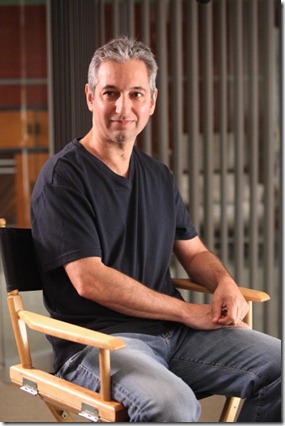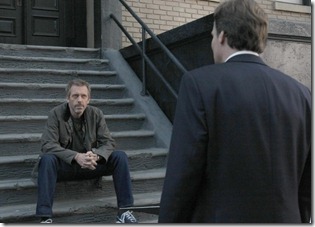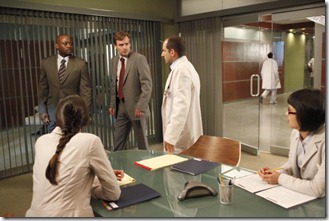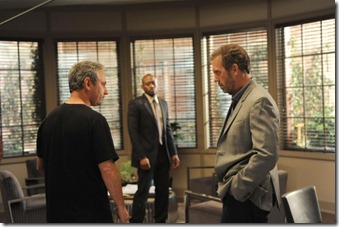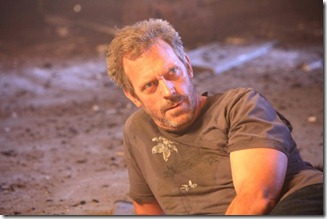Fox’s long-running hit, House (8/7C), concludes its run this evening with a one-hour retrospective entitled Swan Song, followed by the shows series finale, Everybody Dies.
Recently I had the opportunity to take part in a conference call Q&A with series creator – and director/co-writer of the series finale, David Shore. Although spoilers were virtually non-existent, Shore spoke about the way that House took on a life of its own and became this huge hit when he’d been expected it be cancelled before it even concluded its first twelve episodes.
First can you talk about the decision to have Wilson get sick?
David Shore: Yes. It’s one of those things, every year, a couple times a year, we sit down and go, “What do we do to these people? What situations do we throw them into?” And it’s all about which type of situation can give rise to opportunities to explore the character of House and to explore the characters around him. So a lot of ideas are bandied about every year, and one of the ideas that was bandied about, as we were pretty sure we were heading towards the end of the show, was this idea, and it all fell into the category of challenging and exploring the House/Wilson friendship.
I think that’s one of the things that we’ve done very well on this show, if I do say so, is the House/Wilson relationship. There are a lot of explorations on TV of romantic relationships, and some are good and some are bad. I think there are very few explorations of male friendship; not just a wingman type friendship, not just an opportunity for humor, to really explore two friends and their relationship. I think it’s something we’ve done and done well that isn’t done that often. I’m proud of it. So it felt like a natural way to—it felt like the right idea to explore as we headed towards the end of the series.
Looking back, when people look back, what do you want them to most remember about the show years from now?
Shore: The message I hope to be saying basically every week was this was who this guy is and what he stands for. So it’s really about the character and what the character stands for, which is really the pursuit of truth, the not just blindly following things, really asking yourself what is reality here and what is the right thing to do. That search for an objective truth is the thing that I fundamentally found the most interesting throughout the life of the show.
You had mentioned the relationship between House and Wilson. Why do you think Wilson has remained friends with House despite all those sometimes malicious mind games he’s played on him over the years?
Shore: I think there’s something clearly wrong with Wilson as well. It kind of goes back to, I’m not sure how good an answer this is but I think it’s an interesting story, when we were casting Wilson. Robert Sean Leonard was reading for the network and he came in and did a great job, and the network wanted him to be a little kinder, a little nicer. They wanted him to be the nice guy, just the nice guy opposite House, and just to soften him. There was a bit of an edge to the way he was reading it.
Bryan Singer, who was directing it, went off to give him the note outside the room, and I’m sitting there in the room thinking about it going, “I think that’s a bad idea. I think he can’t be too soft; there has to be something about this guy, something that would make him be friends with House. There has to be a bit of an edge to him.” And I ran out of the room to tell Bryan I don’t agree with that note, and tell Robert. And I tell them that, and as soon as I get it out of my mouth BryDan goes, “Oh it’s a terrible note. It’s a terrible note. We’ll have him read it that way, we’ll get him the part, and then we’ll do it our way later.” So we’ve always been aware of the fact that there has to be something about this character that’s a little broken, and I think there is.
With a finale entitled Everybody Dies I’m assuming not everyone will get a happy ending, but what kind of closure can we expect for the series?
Shore: It’s definitely an ending. It’s definitely an ending. I don’t want to say more than that. I don’t want to say more than that. We never do happy endings, but we also try not to simply do miserable endings. Bittersweet is the most you can hope for from us.
Yes, you have this problem of unexpected success; I mean the show just lasted for years and years. Kind of give us an example of what it takes when you realize boy I’m really going to have a lot of episodes to do, because you’ve done the wild things with the shifting of the staff and creating new problems and so forth. Just kind of tell us how things happen when you decide you kind of have a long, long ways to go here.
Shore: Well it was unexpected success. It remains unexpected success somehow. We’ve always been driven by the idea of what interests us, and maybe the fact that it was unexpected success, maybe the fact that we succeeded beyond what we hoped for freed us up to just go, “You know what this is what I want to do now. If it fails miserably that’s okay.” But I think that’s the right way to do a show; I think you have to do the stories that interest you and hope an audience likes it rather than doing stories that you think the audience will like whether you like them or not. I think there has to be something that you find compelling and interesting, and then hopefully an audience will agree with you.
So I was never looking 80 episodes down the road. At most I was looking 10 episodes to 15 episodes down the road. You just sort of put your head down and try and find new situations and new stories.
Okay. So now that you’ve had a chance to do the retrospective and to have House do some thinking in the last episode when you look, having to do all the stuff with your head down so fast, when you look back at the show now what surprises you about what the show has become and about what House has become?
Shore: The fact that I’ve got 24 people on the phone right now listening to my answers to these questions surprises me. The most fundamental surprise to me is that it has wound up being more than a niche audience, although in this day and age you can have very large niche audiences. Right from the beginning, from the time we cast Hugh, I knew it was going to be a show that I would like. I thought maybe some people who were a little like me would like it. I never imagined it would get the following it has gotten, and the international following. And just, yes, that’s kind of reassuring on many levels.
I just want to say (that) over the years House has done some pretty reprehensible things. Was there anything that kind of gave you pause even as you or your writing staff was coming up with it that something you thought might have gone a little too far?
Shore: No, not really. The saying within the writer’s room, my words of wisdom if you will, was the punishment doesn’t have to fit the crime, but there has to be a crime. As long as there was a motivation, as long as there was a House-like motivation, which means not just self-aggrandizement or self-enrichment, as long as it was ultimately about solving that puzzle, which in turn meant getting somebody better, pretty much anything went.
And I think maybe that’s why we— I know there was a real hue and cry when he drove his car through Cuddy’s wall, which was never intended to cause her harm, it was meant to cause her home harm … he looked through the window. But I think that might have been—that was an irrational act. I thought it was a logical and motivated irrational act, but it was still an irrational act, an irrational act from a rational man, which was what we intended and why we had to pay a price the next year. But that may have been why that act got more of a reaction than any of the other, shall we say, reprehensible things he did.
Yes, because he came close to killing people, but he’s come closer than that.
Shore: Yes. The other times he has come closer in an effort to save lives. So there was no upside, I suppose, to driving that car except for a satisfaction of lashing out.
I was curious, what do you think are the highlights of the series and what you think you did that you’re sorry you did now that was kind of a mistake?
Shore: Oh, I’m not going to answer the second part of that question. We made no mistakes. No, I’m sure we made mistakes. I know we made mistakes. It’s one of those things, though, where you keep going and you can’t really assess it because there’s no point in that; you can’t do it over again. You make decisions, you make choices, and they’re never going to be—well you’re never going to know if they’re the ideal choices, but you make choices and you make the most of them.
There are things we did that I’m quite proud of. There are episodes we did that I’m extremely proud of, and most of them, most of them. I think the House/Wilson relationship I think from day one has been a great one. I think constantly refreshing the show was a risky move, but I’m proud of it because it worked more often than it didn’t. I think the show, it’s a type of show which it’s basically a procedural show, but it has enough serialized elements that it could get tiresome, and I’m sure some people believe it did. It didn’t for me, so I think we kept it fresh enough in giving new situations, which is sort of against the instincts of a network show and I’m grateful to them for letting us do it.
So my question is, is there a particular character that’s been especially gratifying to see evolve over the past eight seasons?
Shore: Well first of all let me say I’m glad you asked that, because I think the character of Dr. House has gotten a lot of attention and Hugh has gotten a lot of attention, and I think rightfully so—he’s fantastic. I do think that that character doesn’t work unless you surround him with interesting and smart and complicated characters, and I think to some extent in the media, and perhaps among the award shows, they’ve gotten lost. I think they deserve a huge amount of the credit, every single one of them.
It’s been interesting to watch all our actors, particularly the younger ones, Jesse and Jennifer came back at the end, to watch Jesse grow up really as an actor and as a human being. The others have just been a pleasure, well they’ve all been a pleasure to watch since the beginning, but Jesse and Jennifer are particularly young and then Olivia was young as well. So it’s been interesting watching them mature. So it sounds like they were immature before, but they were actually—we’ve been very lucky in that regard; we had a very grown up set of actors on our show.
Then just as a follow-up, looking forward instead of back what’s next for you? Are you planning on diving back into TV or are you going to take some time off?
Shore: I will take the time to develop something new, so you won’t see something from me in the fall. But I will take a breath, I will go home a little earlier for a little while, but yes, I am planning on getting back into the TV business.
What can you say about the decision to kind of take Chase out of the equation a little bit for the last couple of episodes? I know you said he’s coming back, but at the end of last week’s episode he did leave.
Shore: Yes. He was asked to go do a pilot, and it happened right at a time where we were considering this storyline that happened in the last episode where he decides to move on. So it sort of worked nicely where we were able to give him— We weren’t sure what we were going to do, we were on the fence about that storyline, and then we went, “Oh that storyline seems really good now.” So we let him out to go do a pilot, which I understand has now been picked up so you’ll see him on TV in the fall hopefully, I believe. Not with me, I’ll have nothing to do with it, but you’ll see Jesse still.
So it was all, to a great extent, we were moving towards the ending, we were looking for ways to wrap up our stories, primarily the House/Wilson thing was the focus, but we were aware that the supporting characters also needed some element of closure in the broadest sense. And we didn’t want to throw it all into the final episode; it felt a little convenient to have everything happen in the final episode. And Jesse’s been with us since the beginning so we decided to give him his own little ending story, and I thought he was great.
My question I was wondering if you could tell us, you said that you would be getting back into TV shows, can you tell us more about what kind of shows you would like to do in the future?
Shore: Well I don’t want to just repeat myself. One of the great things about this business, one of the tragic things about this business, is you have to start over again, although then one of the great things is you get to start over again all the time. So I’m looking forward to exploring new characters, new show, new idea, new setting probably. But I am who I am; there are going to be elements of me in whatever I do, and one of the great things about this show was channeling some of my own subconscious. I suspect that will sneak into everything I do.
Do you ever have any regrets about pairing up House with Cuddy?
Shore: No, because I’m not big on regrets. That’s not to say it was perfect. I do fundamentally believe that we had to do it, and I know a lot of people think we could have done it better, a lot of people think we shouldn’t have done it, a lot of people think once we do it we should have kept them together. It’s been a bit of a lightening rod. I think it was going to be a lightening rod no matter what we did. I’m not saying we did everything perfect, I’m not saying we did things horribly either; I think we did a lot of stuff really well. I think it was a difficult thing to do at all. Well it’s an impossible thing to do without getting that sort of response.
But fundamentally, I’m rambling a bit, fundamentally we had to do it. You can’t have people just go on; you can’t have sexual tension go on and on and on and on. And it was there from the beginning and I enjoyed working with it from the beginning, but at a certain point we had to put them together.
You talked about changing up the show a bit. Whenever you basically recast a lot of the show, and you did it twice, were you worried about how that would affect the fans and the ratings and everything?
Shore: I was, but not overly. I was aware that people would be disappointed with some things. You have to make changes before people are clamoring for changes, though. If people are asking for changes it’s too late. You have to have people a little bit upset. How you calculate that I don’t know. And I just think that’s the death of a show, too, is to be driven by those considerations. If your audience doesn’t like something you should think to yourself, ‘Well why don’t they like something? Is there something wrong here?’ And if they like something you should think to yourself, ‘Why do they like it? What am I doing right here?’ and deal with those issues. But you have to be driven by the stories that you want to tell, you can’t simply be responding or there won’t be any real heart to those stories anymore.
Also, for the last episode that you directed is there anything, without giving it away, that you can kind of talk about that you’re most excited for the fans to see?
Shore: Well it’s about House assessing, at the end of this Monday’s episode House is put into a very difficult position, and it’s about him assessing his future. That’s all I’m saying.
What was it like for you directing the final episode of this series that you created and worked on for such a long time?
Shore: It’s very weird. It’s one of those things where my answer isn’t as satisfying as I’d like it to be, because directing is a very all-consuming job and what you want to do there as you’re coming down the final road is to just sit back and enjoy and let the wind flow through your hair. And you’re directing, and you’re sitting there going, ‘I need to make this shot, how many hours do we have left in the day, how many hours behind are we,: and you’re just constantly worried about doing the job. So 98% of the time was just doing the job, and then 2% of the time was our first AD would say, ‘Ladies and gentlemen, that’s a series wrap on Mr. Jesse Spencer,’ and you would go, ‘Oh my God, where am I,’ and you would react and you would take that moment. And then somebody would say, ‘We have to get back to work; we’re an hour behind.’
And when the series first started did you have any sort of end game in mind or—
Shore: No, no, in my mind that would have been incredibly pompous. The idea that this was going to last more than 12 episodes and that I could plan an ending is just way too arrogant. It’s American network TV; I fully expected it would just stay on the air and I would tell individual stories about this individual until they told me I couldn’t do that anymore.
I was wondering did the direction of House change when the players starting performing from the vision you conceptualized?
Shore: Not really. The great thing about Hugh Laurie, from my point-of-view, is that he and I have shared the same vision of this character from day one. We read a lot of people and we met with a lot of people and nobody seemed to get it, and then he came in and he was House. If you watch his audition tape, which you can from the, I think, season one DVD, he was doing the same thing then that’s doing now, and it was without any direction, without any coaching. He put himself on tape over in Africa and sent it into us, and he obviously was thinking the exact same ways that we were. It’s been a wonderful collaboration for me.
There have been some other characters where you go, ‘Oh that works or that doesn’t work, mainly that works,’ but it’s difficult in TV to do too much of that, because you need to have your scripts ready and planned out well in advance of when you’re shooting.
My other question is what three components do you believe were most effective to endearing House to the audiences?
Shore: What components? Three components; I have to single out three components?
Yes please.
Shore: Well there’s an alchemy to these things, and I’m not sure you can single out any component. He is who he is and people responded, and I don’t know if you took away anything what it would be. It’s Hugh Laurie’s eyes, it’s the character’s sense of humor, and the fact that he’s a bit of a 15-year old boy, and a hundred other things.
Just to go back to the finale episode, you’re directing it but can you tell us who wrote that final script?
Shore: Well as any great director would I give full credit to the writers, which is me. I wrote it with Eli Attie and Peter Blake, who were two of my long-standing writers on the show. We planned it out sometime in advance and the three of us wrote it.
Then just as a follow-up, are the returning characters, like Thirteen and Masters and Kutner and Cameron, are they all being introduced kind of organically into the storyline or did you guys have to kind of mess with the storyline as you got confirmation that they were able to return?
Shore: We developed this idea months and months ago, the idea for this final episode, which when you see it it will start to become clear, and there were many things that I liked about this idea. It allowed us to explore who he was and the nature of his character and sort of take a look at who he is as a human value and his value as a human being. It also allowed us to naturally bring back other people, and so I started making phone calls.
After working on this show for so long what’s the thing that you’ve learned about yourself throughout the experience?
Shore: Oh boy. I should have learned a lot of stuff right? Nobody learns anything; you reach your emotional peak at age 18. I do know there are some things I’m better at than other things, and that they have become quite focused. I feel like if I were to say a positive thing about me that I learned it would sound nasty and I feel like if I said a negative thing about myself I just don’t want to do that. But there are probably negative things I’ve learned more than anything else.
I want to thank all of you. You have helped make this the success it was; you guys have helped bring an audience to us, you’ve supported us from very early on. If any of you didn’t support us early on then you can ignore this, but we had very good support from the media and the critics right from the beginning, and I’m very grateful to it because I really think that we grew slowly and I think your support really helped make that happen, along with American Idol’s support. But I think all those things allowed me to do what I’ve dreamt of doing.
Photos by Adam Taylor and Byron Cohen/Courtesy of Fox Television
